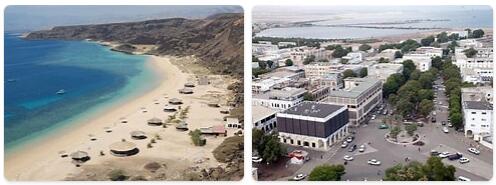Passenger flights to Djibouti have been suspended as of March 18 and indefinitely.
Safety
Djibouti is a relatively stable country. The country is small and relatively clear. With the revenue generated from the port and military bases, the authorities can ensure a great deal of control over the territory. An effective intelligence apparatus contributes to this. There is little doubt that the extensive military presence from countries such as the United States and France is helping to stabilize the country. The income from the bases is an important factor in this regard.
Norway is represented by an honorary consulate in Djibouti. Responsible Norwegian embassy for Djibouti is Ethiopia.
There have been few terrorist attacks against Djibouti – the only exception in recent times was the terrorist attack on a restaurant in the center of Djibouti city in May 2014. This estimate is attributed to Al-Shabaab. After that time the situation has been calm. International players perceive the situation in Djibouti as relatively safe.

Entry
Please note that entry regulations may change. The Foreign Service is not responsible if the following information on entry regulations or visa requirements is changed at short notice. It is the responsibility of the traveler to ensure that travel documents are valid for entry and to familiarize themselves with the current entry rules for each country.
Norwegian citizens need a visa to stay in Djibouti. The embassy recommends that you obtain a visa to Djibouti in advance, although it is possible for Norwegian citizens to buy a tourist visa on arrival. For other visas contact the Djibouti Embassy in Brussels.
It is recommended that passports have a minimum period of six months when entering Djibouti.
Health
Coronavirus (covid-19): Norwegian travelers are encouraged to consider returning home as soon as possible – in a safe and quiet manner. Norwegian citizens residing in Djibouti are asked to follow the advice, guidance and instructions of local authorities on how to deal with the situation. To limit the spread of the virus, Djibouti has suspended passenger flights from March 18 and indefinitely. Goods will still be transported by air.
***
You can find hospitals of international standard in Djibouti, but they do not cover all specialties.
It is estimated that about 2.5 percent of the adult population of Djibouti lives with HIV. Unprotected sex involves a significant risk of infection for HIV and sexually transmitted diseases.
For information on vaccines see the Public Health Institute’s website. Medications are available, but be aware that prices may be high. For more information see WHO’s website about Djibouti.
Practical information
Time difference to Norway: Two hours in winter time and one hour in summer time
Electricity: 220 V
Language: French, Arabic, Somali and Afar
National telephone code: +253 (allcitycodes)
Internet domain:.dj
Currency value: Djibouti franc
Credit card: Accepted for ATM/ATM withdrawal
Normal opening hours: Stores are open 08: 00-12: 00/14: 00-20: 00 and are usually closed on Fridays and public holidays. Grocery stores are open from 8am to 8pm, open on Fridays but closed on public holidays. Offices are open from 7am to 2pm, closed in the afternoon
National holidays are first New Year’s Day, Mouloud May 1, May Al-Isra al Miraj (first day of Ramadan), May 27-28. June Independence Days (two days),
Aid-al-Fitri (end of Ramadan, two days), September 22 Youm Araft, Aid-Al-Adha (two days), October 14 (Muslim New Year)
Foreigners must be able to identify themselves on request and it is recommended that passport copy be brought.